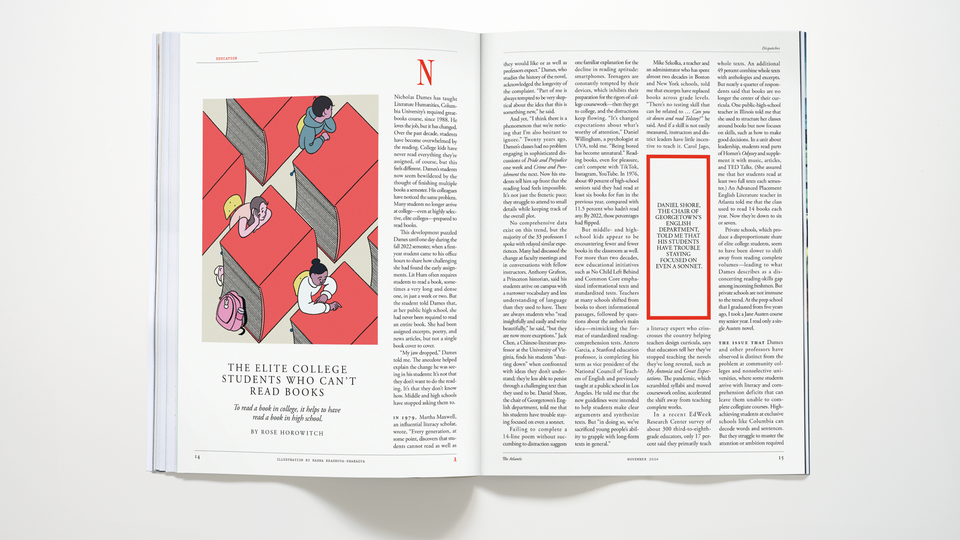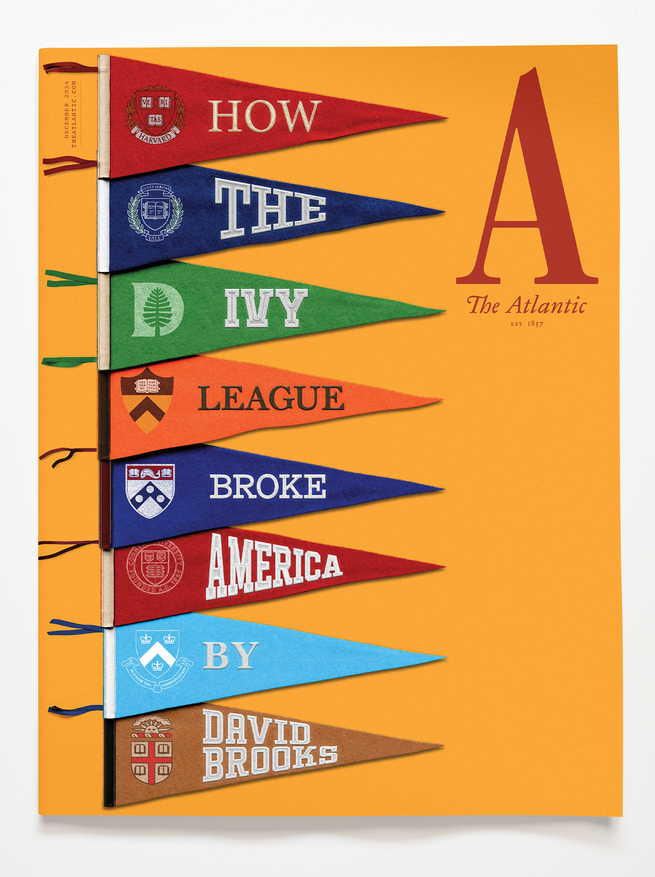Falling in Love With Reading Will Change Your Life
7 min read
The Elite College Students Who Can’t Read Books
To read a book in college, it helps to have read a book in high school, Rose Horowitch wrote in the November 2024 issue.
I’m an English teacher at a private college-preparatory school, and much of “The Elite College Students Who Can’t Read Books” sounded familiar. My students, too, now struggle to read long texts. Unaddressed in this apt article, though, are changes to the broader high-school context in which reading for homework now occurs. Today, students with elite college aspirations have extracurricular schedules that demand as much—if not more—time than school itself. These commitments are necessary, in their eyes, to gain admission to selective institutions. As a result, teachers face considerable pressure from not only students but also parents and school administrators to limit homework time—no matter if the assignment is a calculus problem set or Pride and Prejudice. In combination with considerably slower rates of reading and diminished reading comprehension, curtailed homework time means that an English teacher might not be able to assign more than 10 to 15 pages of relatively easy prose per class meeting, a rate so excruciatingly slow, it diminishes one’s ability to actually grasp a novel’s meaning and structure. I see how anxious and drained my students are, but I think it’s important for them to experience what can grow from immersive reading and sustained written thought. If we want students to read books, we have to be willing to prioritize the time for them to do so.
Anna Clark
San Diego, Calif.
As a professor, I agree with my colleagues who have noticed the declining literacy of American students at elite universities.
However, I am not sure if the schools are entirely to blame. In American universities, selection is carried out by admissions offices with little interest in the qualities that faculty might consider desirable in a college student. If faculty members were polled—something that has never happened to me in my 20-year career—I’m sure we would rank interest and experience in reading books quite highly.
Admissions decisions in the United States are based on some qualities that, however admirable, have little or nothing to do with academic aptitude. In contrast, at Oxford and Cambridge, in the United Kingdom, undergraduate admissions are typically conducted by the same academics who will teach those students. Most personal statements primarily consist of a discussion of which books the student has read and what they learned from them. Students are then expected to discuss these books in more detail in an interview. When considered alongside the undergraduate selection process, the decline in literacy among American undergraduates is totally understandable.
Ione Fine
Psychology Professor, University of Washington
Seattle, Wash.
Having taught English in a public school for 32 years, I am not surprised that colleges and universities are discovering that incoming students lack the skill, focus, and endurance to read novels. Throughout my career, primarily teaching ninth graders, I fostered student readership not by assigning novels for the whole class to read, but rather by allowing students to select young-adult books that they would read independently in class. Thousands of lifelong readers were created as a result.
Ten years ago, however, my district administration told me that I could no longer use class time for independent student reading. Instead, I was to focus on teaching skills and content that the district believed would improve standardized-test scores. Ironically, research showed that the students who read more books scored significantly better than their classmates on standardized reading tests.
I knew that many students were unlikely to read at home. So I doubled down: I found time for students to read during the school day and repurposed class time to allow my students to share their ideas; to question, respond, and react along with their peers. The method was so successful that the district adopted my approach for seventh through ninth grade, and I published a university-level textbook preparing teachers to create similar communities of readers in their own classrooms.
Whole-class novels just aren’t working: Some students will always be uninterested in a teacher’s choice, and perceive the classics as irrelevant and difficult to comprehend. But allowing students to select their books can help them fall in love with reading.
Michael Anthony
Reading, Pa.
I am an educator of 16 years living in New Hampshire. “The Elite College Students Who Can’t Read Books” reflects a lot of what I’ve seen recently. But a large piece of the puzzle is public-school budgets. A major reason novels have been removed from curricula is money: Many districts cannot afford to purchase a book for every student, especially in the upper grades. Typically, districts will buy a “class set” of novels, about 20 to 30 books—that’s it. The books must be used during the English blocks for instruction and reading time. There are not enough books for students to take home and read; if they are reading them only in their class block, a novel will take months and months to finish. I knew of one district that would have teachers make copies of entire novels to share with their students; they’d take turns on copy duty to pull it off. I wish I could teach more complete novels, because students love it. But districts need budgets large enough to buy books for everyone.
Meaghan Kelly
Rumney, N.H.
When teaching my college history courses, I have polled my students to see how many have ever read a book cover to cover. Sometimes, only a few students would raise their hand.
I inquired because I always gave them the option to read a book instead of writing a 10-page research paper. They then would have a one-on-one, hour-long discussion with me about the book they’d selected. Students who chose that option generally had a good experience. But one student shines bright in my mind. In truth, I didn’t remember him well—but he stopped me at an alumni function to say thank you. He had taken my class the second semester of his senior year to fill an elective, and he had chosen to read David McCullough’s 1776. He’d devoured the book—and he’d loved our discussion. He told me that the assignment had changed his life: Up to that point, he had never read a whole book. Since that class, he has read two or three books a month, and now has hundreds of books in his own library. He assured me that he would be a reader for the rest of his life.
It was one of the most gratifying moments of my career. I hope more teachers, professors, and parents give their students a chance to learn what this student did—that books are one of the great joys in life.
Scott Salvato
Mooresville, N.C.
Rose Horowitch replies:
Anna Clark’s letter builds on an idea that I hoped to convey in the article: that the shift away from reading full books is about more than individual students, teachers, or schools. Much of the change can be understood as the consequence of a change in values. The professors I spoke with didn’t think their students were lazy; if anything, they said they were overscheduled and frazzled like never before, facing immense pressure to devote their time to activities that will further their career. Under these circumstances, it can be difficult to see how reading The Iliad in its entirety is a good use of time. Acknowledging this reality can be disheartening, because the solution will not be as simple as changing curricula at the college, high-school, or middle-school level. (And as several of these letters note, changing curricula isn’t all that straightforward.) But letters like Scott Salvato’s are a hopeful reminder of the power of a good—full—book to inspire a student to become a lifelong reader.

Behind the Cover
In this month’s cover story, “How the Ivy League Broke America,” David Brooks describes the failure of the United States’ meritocracy, created in part by James Conant, the influential president of Harvard from 1933 to 1953. Conant and like-minded reformers had hoped to overturn America’s “hereditary aristocracy of wealth”; instead, they helped create a new ruling class—the so-called cognitive elite, selected and credentialed by the nation’s top universities. For our cover image, the artist Danielle Del Plato placed the story’s headline on pennants she created for each of the eight Ivy League schools, which have been instrumental in shaping and perpetuating America’s meritocracy.
— Paul Spella, Senior Art Director
Corrections
Due to an editing error, “The Elite College Students Who Can’t Read Books” (November) misstated the year Nicholas Dames started teaching Literature Humanities. He began teaching the course in 1998, not 1988. “What Zoya Sees” (November) misstated where in Nigeria Zoya Cherkassky-Nnadi and her husband, Sunny, have a home. Their home is in Ngwo, not Igwo.
This article appears in the December 2024 print edition with the headline “The Commons.”




